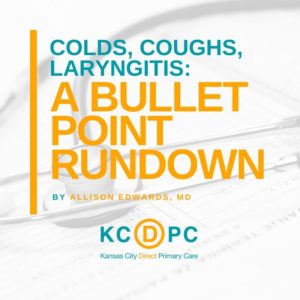 Medical name: upper respiratory infection, acute bronchitis, laryngitis
Medical name: upper respiratory infection, acute bronchitis, laryngitis
Major symptoms: congestion, runny nose, cough, sore throat, headache, hoarseness, fatigue, overall feeling crummy, occasional low-grade fever
Caused by: viruses about 85% of the time (rhinovirus, coronavirus, influenza, RSV, and/or parainfluenza; less commonly adenovirus, eterovirus, or metapneumovirus).
How you catch it: symptoms come on 24-48 hours after coming into contact with the respiratory secretions of an infected person (i.e. coughs, sneezes, runny noses, and dirty objects that have been contaminated by these things). Symptoms peak at 3-4 days in, significantly improve by the 7-day mark, and should resolve by 14 days or so (but sometimes coughs can last for a couple weeks to a month). In a 1997 study, researchers found that colds last an average of 11 days. Uggh.
How long am I contagious? And how to treat it? There isn’t great data on “contagiousness” — but if you’ve got symptoms, it’s a good idea to stay away from fragile people, wash hands frequently, and give others a fair warning you’re sick. Colds are treated by basic symptomatic care: stay well hydrated, take it easy, don’t smoke or drink alcohol, try nasal saline washes/sprays (like these) and humidifiers to clean/moisten nasal passages. Fair warning: most over-the-counter medicines for cough/colds don’t really work. The ones that have the best evidence (check with your doctor before starting any new medication) are ibuprofen or acetaminophen for pain, pseudoephedrine for congestion, diphenhydramine for allergy symptoms and (less so) for congestion, loratadine or cetirizine for allergy symptoms, or guaifenesin (Mucinex) as a mucous thinner. Always make sure to read all labels carefully to ensure that you are not taking a double dose of any one medication!
It can turn into: sinus infections, ear infections, asthma or COPD exacerbation, meningitis, pneumonia (lower lung infection), dehydration, or other secondary bacterial infections. Generally speaking, if you were cruising along at day 5+ of illness and feel like things took a turn for the worse, you may be dealing with a bacterial secondary infection. Reach out to your doctor for guidance if this — or anything concerning — occurs.
